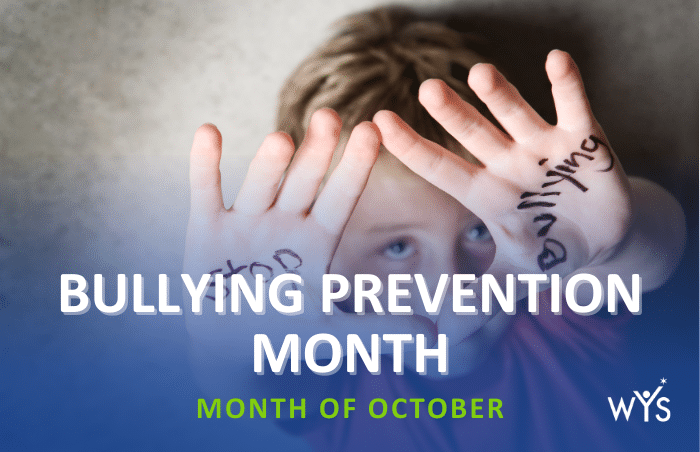
With the start of a new month, Western Youth Services would like to highlight an extremely important cause: bullying prevention. October is National Bullying Prevention Month. This month serves as an opportunity for everyone to practice being kind, inclusive and to take action if you or someone you know is experiencing bullying. At WYS, we are committed to raising awareness and providing education about bullying prevention and its profound impact on youth mental health. Continue reading to learn more about how bullying affects youth mental health, how our BHTC and Bullying Prevention and Intervention trainings can help, and additional resources for those experiencing bullying or mental health struggles.
The Link Between Bullying and Youth Mental Health
Bullying is a widespread issue throughout the United States. The CDC states that the reports of bullying are highest in middle schools (28%) followed by high schools (16%), combined schools (12%), and primary schools (9%). Bullying can not only affect an individual’s physical health, but it can also negatively impact their mental health, including anxiety, depression, and social isolation.
With the increased presence of youth on social media platforms and other online activities, cyberbullying is also on the rise. According to a 2022 Pew Research Center survey, 46% of U.S. teens have experienced some form of cyberbullying, with 53% saying that online harassment is a significant problem for their age group.
Bullying can be incredibly damaging to the mental health of everyone involved in a situation including the victim, the perpetrator, and any bystanders. According to the CDC, students who experience bullying are at increased risk for depression, anxiety, and sleep difficulties. While bullying is a large issue in adolescence today, there are ways that it can be prevented.
Importance of Building Resilience
Building resilience in youth is essential for helping to mitigate the mental health effects of bullying. According to the American Psychological Association, building resilience—the ability to adapt well to adversity, trauma, tragedy, threats, or even significant sources of stress—can help children manage stress and feelings of anxiety and uncertainty.
Here are some ways you can help promote resilience according to the APA:
- Make connections – Teach your child how important it is to connect with others by practicing empathy and listening. Encourage them to reach out to friends in person, or through phone calls, video chats, or texts. Strengthening family bonds is also key. Building these connections gives children social support and helps them become more resilient.
- Maintain a daily routine – Having a routine can be comforting for children, especially younger ones who need structure. Work together with your child to create a routine that includes time for schoolwork and play. During stressful times or big changes, you might need to adjust some parts of the routine, but keeping a consistent schedule is still important.
- Take a break – Teach your child to focus on things they can control or do something about. Help them challenge unrealistic thoughts by asking them to think about how likely the worst-case scenario really is and what advice they would give a friend with the same worries.
- Nurture a positive self view – Remind your child of times when they’ve successfully dealt with tough situations and help them see how these experiences have made them stronger for the future. Encourage them to trust their ability to solve problems and make good choices. At school, show them how their personal achievements help the whole class succeed.
- Accept change – Change can be scary for kids and teens. Help your child understand that change is a normal part of life and that when certain goals can’t be reached, new ones can take their place. It’s also important to recognize what’s going well and make a plan to address what isn’t. At school, point out how students have grown and changed as they’ve moved up in grades, and discuss how those changes have affected them.
BHTC and Bullying Prevention and Intervention Trainings
Early intervention and education are vital components to reducing the prevalence of bullying and its mental health effects. At WYS, we recognized the need for this type of education and prevention which is one of the reasons why we collaborate to produce the Behavioral Health Training Collaborative (BHTC) and Prevention and Intervention Trainings. Western Youth Services, along with four local partners, form the (BHTC). This initiative provides free mental health and wellness trainings with focuses on topics like; healthy coping skills for stress and anger management, understanding adverse childhood experiences (ACEs), trauma-informed care and so much more. By working together, we’re able to offer a wide range of topics. Whether you’re an individual, family member, community group, school, agency, or professional seeking training or continuing education, we have options tailored to your needs. For more information or to register for training, click here.
Our Bullying Prevention and Intervention Training equips educators, parents, and community members with the tools they need to recognize, address, and prevent bullying in schools. These no-cost trainings are available at the RESET Toolbox. You must register with the RESET Toolbox to access these free trainings. To register for the RESET Toolbox, click here.
Additional Resources and Support
If you or someone you know are facing the effects of bullying, here are some additional resources you may find helpful:
- Mental Health of America: Youth Mental Health Screening
- Find a local support group with kids facing similar challenges
- Miscellaneous online mental health resources
Overcoming bullying requires community, support, and resilience. Please know that help is available, and early intervention can prevent long-term mental health challenges. We highly encourage those affected by bullying to seek support and utilize the resources provided. Together, we can create safe spaces for healing and growth. With kindness and understanding, we build the strength to overcome challenges and foster a future where compassion prevails.
If your child or a young loved one is struggling with a mental health concern, we encourage you to reach out to a mental health professional or to contact an Access Coordinator at Western Youth Services by sending an email to [email protected] or by calling us toll-free at 888-312-0406.
Orange County, State and National resources can be found on our site here: https://www.westernyouthservices.org/resources/.






